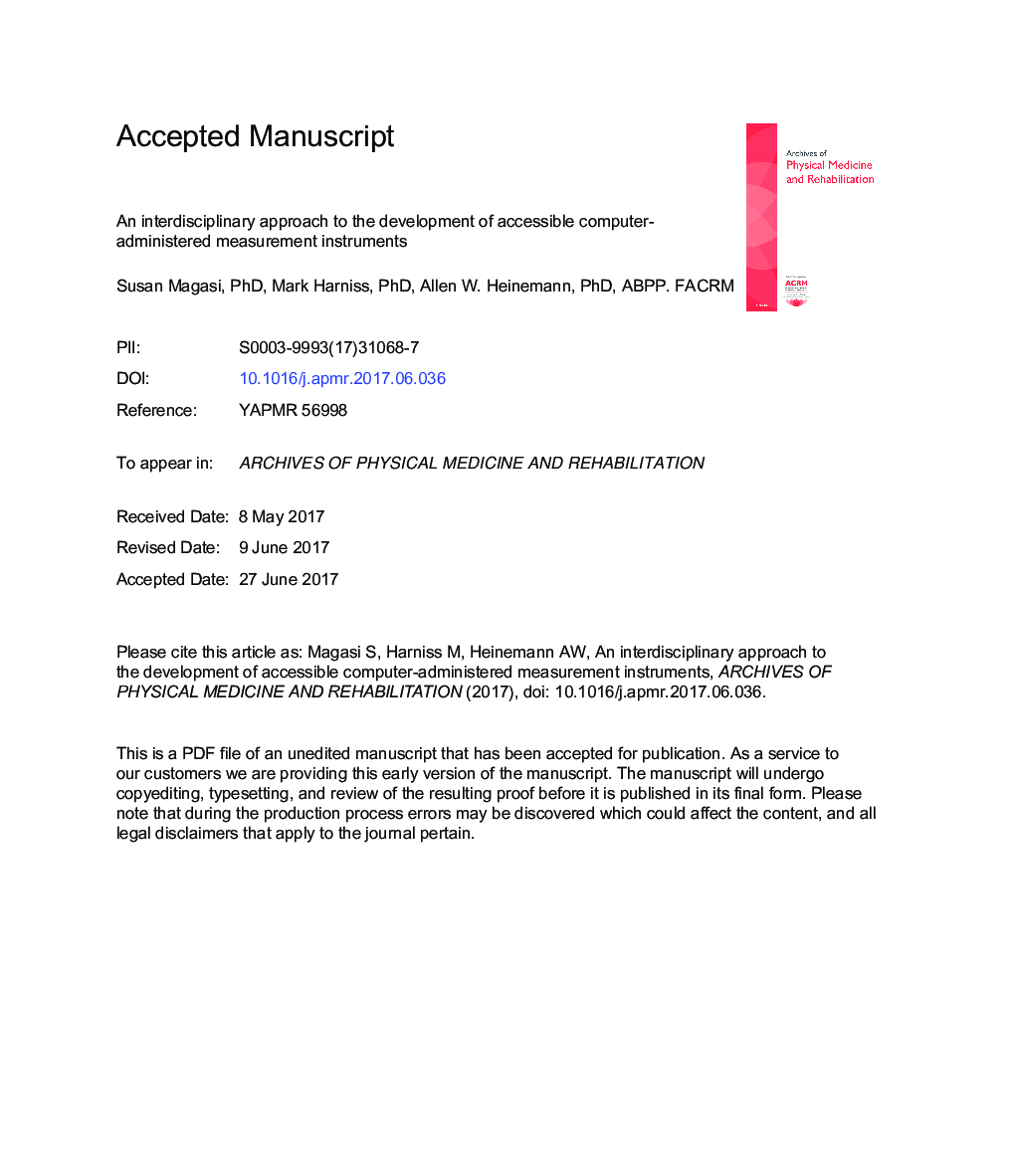| کد مقاله | کد نشریه | سال انتشار | مقاله انگلیسی | نسخه تمام متن |
|---|---|---|---|---|
| 8753811 | 1595646 | 2018 | 23 صفحه PDF | دانلود رایگان |
عنوان انگلیسی مقاله ISI
Interdisciplinary Approach to the Development of Accessible Computer-Administered Measurement Instruments
ترجمه فارسی عنوان
رویکرد بین رشته ای به توسعه ابزارهای اندازه گیری مجاز قابل استفاده توسط کامپیوتر
دانلود مقاله + سفارش ترجمه
دانلود مقاله ISI انگلیسی
رایگان برای ایرانیان
کلمات کلیدی
ترجمه چکیده
اصول عدالت در آزمون نیاز به این دارد که تمام تست های مستهلک شده، از جمله افراد دارای معلولیت، دارای فرصت های برابر برای نشان دادن ظرفیت خود در ساختار اندازه گیری شده باشند. ویژگی های طراحی اندازه گیری و پروتکل های ارزیابی می تواند مانع افراد معلول شود. عادلانه بودن تست یک مساله اساسی اساسی در تمام مراحل طراحی، مدیریت و تفسیر ابزار اندازه گیری در عمل و تحقیق بالینی است. راهنماهای محدود برای توسعه دهندگان ابزار در مورد چگونگی توسعه و ارزیابی دسترسی و قابلیت استفاده ابزار اندازه گیری وجود دارد. این مقاله یک فرایند تکرار شش مرحله ای برای توسعه ابزارهای اندازه گیری قابل دستیابی رایانه مبتنی بر روش های اجرا شده در چندین طرح اصلی اندازه گیری را توصیف می کند. یکی از مولفه های اصلی این فرایند، گروه های بین رشته ای از کارشناسان دسترسی، کارشناسان محتوا و اندازه گیری، کارشناسان فناوری اطلاعات و افراد دارای معلولیت با هم کار می کنند تا اطمینان حاصل شود که ابزار اندازه گیری توسط کاربر طیف وسیعی قابل دسترسی و قابل استفاده است. توسعه ابزارهای سنجش قابل دسترس نه تنها یک الزام اخلاقی است، بلکه علم بهتر را با به حداقل رساندن تعصب اندازه گیری، از دست دادن داده ها و ساییدگی ناشی از ناسازگاری بین جمعیت هدف و پلت فرم مدیریت پروتکل و پروتکل ها، تضمین می کند.
موضوعات مرتبط
علوم پزشکی و سلامت
پزشکی و دندانپزشکی
پزشکی و دندانپزشکی (عمومی)
چکیده انگلیسی
Principles of fairness in testing require that all test takers, including people with disabilities, have an equal opportunity to demonstrate their capacity on the construct being measured. Measurement design features and assessment protocols can pose barriers for people with disabilities. Fairness in testing is a fundamental validity issue at all phases in the design, administration, and interpretation of measurement instruments in clinical practice and research. There is limited guidance for instrument developers on how to develop and evaluate the accessibility and usability of measurement instruments. This article describes a 6-stage iterative process for developing accessible computer-administered measurement instruments grounded in the procedures implemented across several major measurement initiatives. A key component of this process is interdisciplinary teams of accessibility experts, content and measurement experts, information technology experts, and people with disabilities working together to ensure that measurement instruments are accessible and usable by a wide range of users. The development of accessible measurement instruments is not only an ethical requirement, it also ensures better science by minimizing measurement bias, missing data, and attrition due to mismatches between the target population and test administration platform and protocols.
ناشر
Database: Elsevier - ScienceDirect (ساینس دایرکت)
Journal: Archives of Physical Medicine and Rehabilitation - Volume 99, Issue 1, January 2018, Pages 204-210
Journal: Archives of Physical Medicine and Rehabilitation - Volume 99, Issue 1, January 2018, Pages 204-210
نویسندگان
Susan PhD, Mark PhD, Allen W. PhD, ABPP, FACRM,
